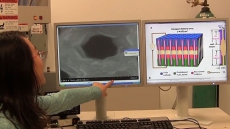Does your smartphone fail to recognise you at times when you try to use "face unlock" system? Upload an "average" photo of yourself for better recognition.
According to new research by scientists at the University of York, face recognition security on smartphones can be significantly improved if users store an "average" photo of themselves.
David Robertson found that combining different pictures of the user, rather than a single "target" image, leads to much better recognition across all kinds of daily settings.
The researchers examined the performance of the 'face unlock' system on Samsung Galaxy smartphones.
"We chose to study the Samsung Galaxy because it is a very popular phone which comes with working face recognition technology," Robertson added.
They found that the system was generally very good at rejecting imposters but that it often failed to recognise the genuine owner too.
However, performance could be greatly improved, often to perfect levels, if users stored an 'average' of their own photos -- formed by morphing together several different photos of the user.
"We expect this technique to work across a wide range of phones and other automated recognition devices. It is very interesting that performance can be so much improved by copying a simple trick performed by the brain," he noted in a paper published in the journal PLOS ONE.
The idea for this technique comes from studies of human face recognition. It is understood that the brain forms abstract representations of the faces it knows, and that people are very good at recognising their family and friends over a range of conditions.
If it is possible to copy these representations, then automatic face recognition can improve.
"Using 'average' images is a simple way to do this," the authors concluded.




